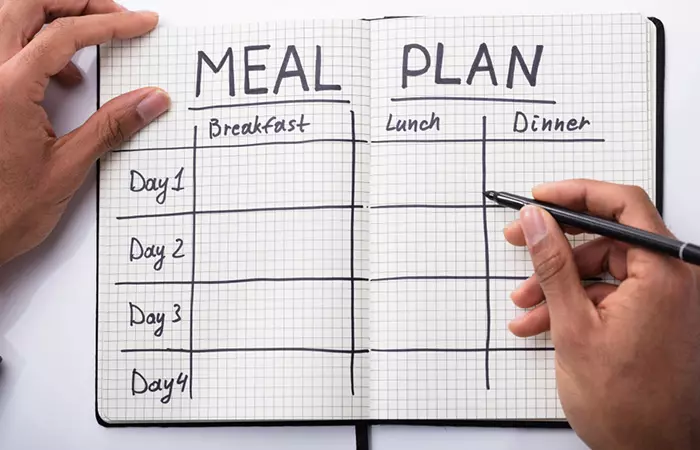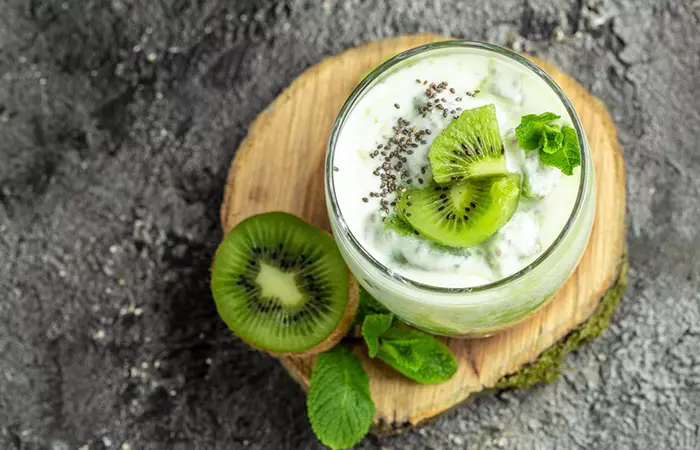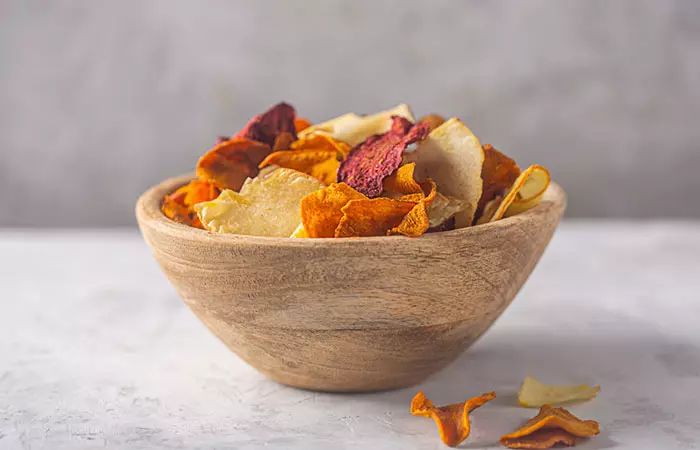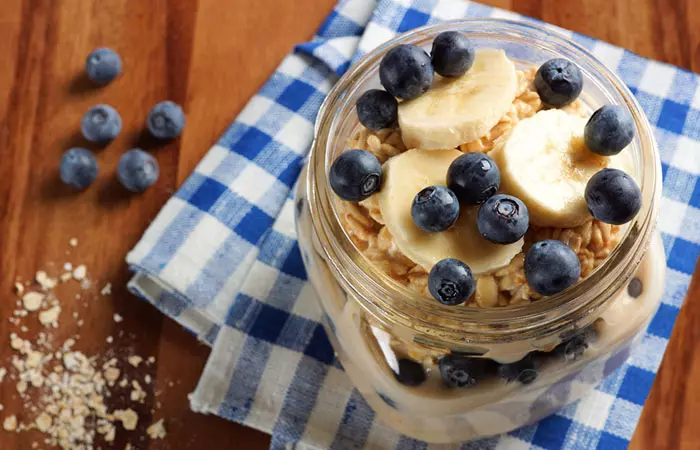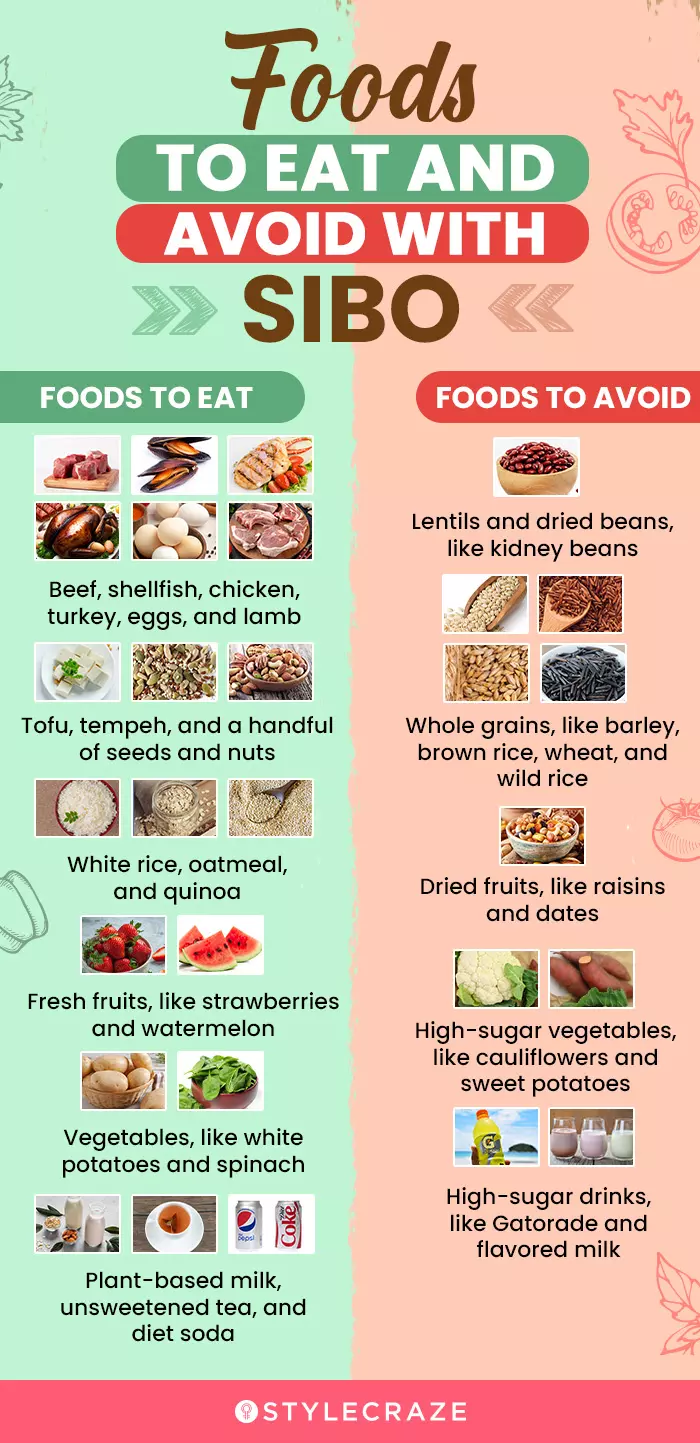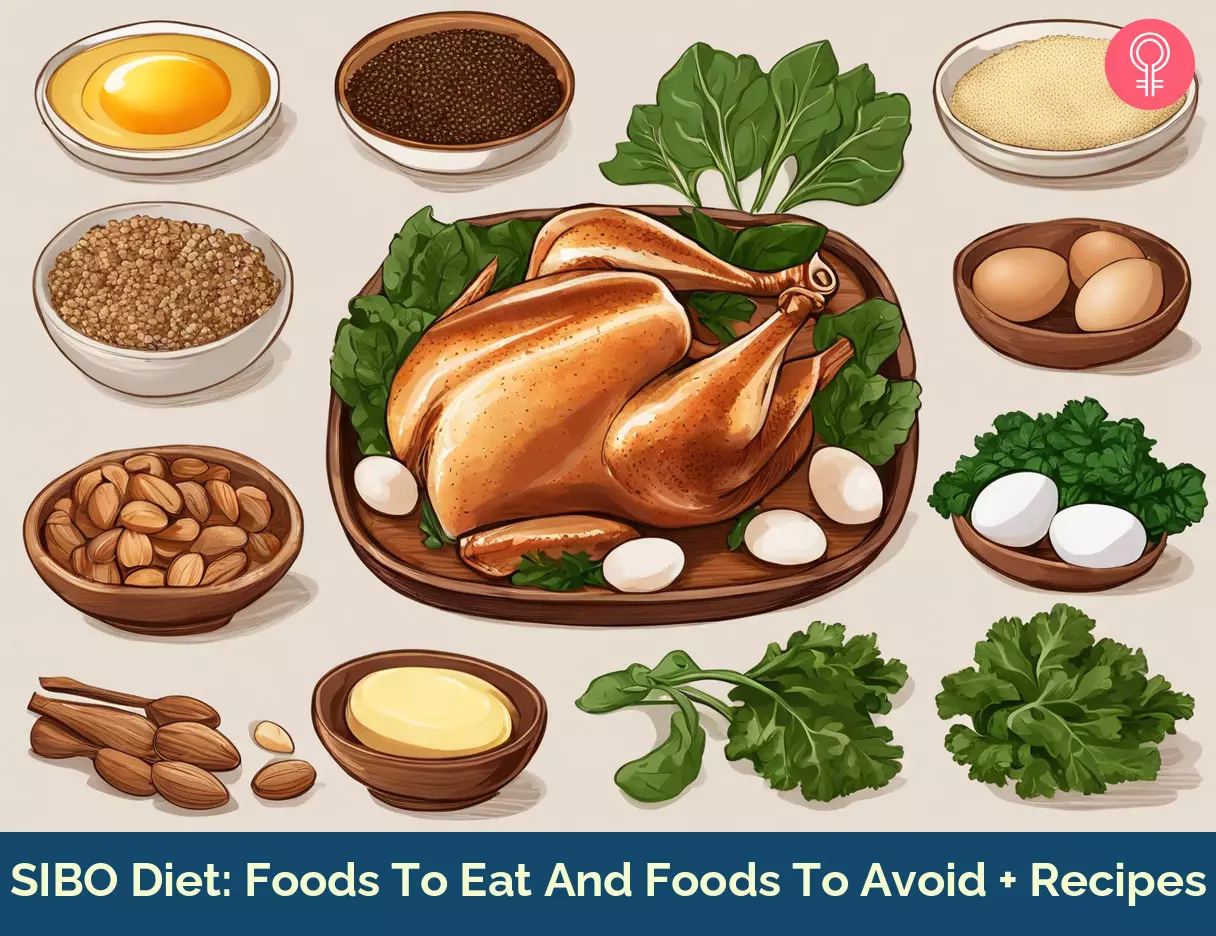Apart from medical treatment, managing this condition requires careful attention to what you eat and your daily lifestyle. A well-planned SIBO diet with healthy lifestyle changes can improve your overall digestive health. In this article, we will explore the effectiveness of this diet, a sample food list, and some delicious recipes you can enjoy.
What Is The SIBO Diet?
The SIBO diet is a short-term elimination diet that includes foods that are less likely to ferment in the small intestine and cause bacterial overgrowth. It is designed to reduce the digestive symptoms this overgrowth can cause. There is little research on this diet. However, some believe it may help ease SIBO symptoms as the diet overlaps with several other diet plans focused on improving gut health and easing discomfort. We have listed some of those diet plans below.
Low-FODMAP Diet
This diet restricts bread, cereal, some fruits, vegetables, pulses, some fruits, vegetables, pulses and dairy-based milk that contain hard-to-digest fermentable carbohydrates. A low-FODMAP diet could be a potential treatment for gastrointestinal issues like irritable bowel syndromei A common intestinal disorder characterized by symptoms like abdominal pain, bloating, gas, diarrhea, and constipation. (IBS) (1).
Specific Carbohydrate Diet (SCD)
This is a grain-free, low-sugar diet that may help people with gastrointestinal conditions like Crohn’s diseasei A chronic disease that causes inflammation in the lining of the digestive tract. and irritable bowel syndrome (2). This diet eliminates carbohydrates that do not break down easily and may also benefit individuals with SIBO. However, more studies are warranted to support this claim.
Bi-Phasic Diet
This is a two-phase diet plan that combines the principles of the low-FODMAP and SCD diets to manage the symptoms of SIBO. Phase 1 is restrictive and includes the low-FODMAP or SCD diet. It lasts for 2 to 6 weeks and starves and reduces the excess bacteria population. Phase 2 is the reintroduction phase that lasts for 4 to 6 weeks and helps identify individual dietary triggers. While the diet looks promising, it has no scientific backing.
Elemental Diet
This is a liquid diet plan that contains all the required nutrients in digestible forms. Some research suggests that it may help treat various inflammatory bowel diseases, including Crohn’s disease (3). Studies also suggest that the elemental diet may even help normalize the abnormal results of a lactulose breath testi A non-invasive medical test that measures the hydrogen levels in your breath to diagnose small intestine bacterial overgrowth (SIBO). in people with irritable bowel syndrome (4). The paleolithici A dietary pattern that includes unprocessed and whole foods presumably eaten by people during the Stone Age. and low-histamine dietsi A dietary pattern that reduces the intake of foods high in histamine, an excess of which can result in diarrhea and headaches. are a few other options you may incorporate into your SIBO management plan. These work by eliminating carbohydrates and excess sugar from your diet to starve the excess bacteria. However, do note that they are restrictive and must be followed only under a doctor’s guidance to ensure nutritional balance. The right diet to treat SIBO depends on your health care provider, lifestyle, ability to follow a particular diet, and medical conditions, if any. But how effective are these diets? Learn more in the next section.
How Effective Is The SIBO Diet?
Anecdotal evidence suggests that the SIBO diet may help manage the symptoms of the bacterial overgrowth. However, more quality studies are needed to understand if these diets can be adapted as treatments for SIBO. Hence, consult your doctor or a registered dietitian, for a personalized diet plan for your recovery. Avoid treating the condition without expert guidance as it may lead to malabsorption syndromei A digestive disorder that prevents your body from absorbing fluids and nutrients from the food, leading to nutritional deficiencies. and nutritional deficiencies (5). The effectiveness of this diet varies among individuals and depends on the severity of the condition. But if you want to give this diet a go, here is a simple SIBO diet plan you can follow.
SIBO Diet Plan
Note: While dairy products (lactose) and fruits (fructose and fructans) are generally avoided, you may include dairy alternatives or lactose-free dairy products in your SIBO diet upon your doctor’s approval. The SIBO diet allows you to consume both animal and plant-based foods. So, you can adjust your diet as per your preferences. For instance, you may follow a vegetarian SIBO diet by opting for plant-based options like kiwi and almond chia pudding and kale and tofu salad. In fact, these dishes can also be a part of your vegan SIBO diet plan as they have no animal-based ingredients. In the following section, we have included a 7-day SIBO diet meal plan with both vegetarian and non-vegetarian options. Take a look.
7-Day Sample SIBO Meal Plan
Day 1 Day 2 Day 3 Day 4 Day 5 Day 6 Day 7 This is just a sample SIBO meal plan and you do not have to follow it to the T. You may customize it according to the suggestions of your healthcare expert and your food preferences. The following section will help you understand what other foods you can include (and what you must avoid) in your SIBO diet.
SIBO Diet Food List: Foods To Eat And Foods To Avoid
Your doctor or nutritionist may recommend you to temporarily reduce or eliminate FODMAPs from your diet. These include the following types of carbohydrates:
Fructose: Present in fruits, some vegetables, and honey Lactose: Present in animal milk and other dairy products Fructans: Present in gluten-rich foods, fruits, and some vegetables Galactan: Present in lentils and chickpeas Polyol: Present in low-calorie sweeteners
Note: While dairy products (lactose) and fruits (fructose and fructans) are generally avoided, you may include a few of them in your SIBO diet upon your doctor’s approval. You can check out the complete SIBO diet food list below. Note: Everyone reacts to different foods differently. While some of these foods may be safe for others, your case could be different. Keep your food sensitivities and allergies in mind before including them in your diet. These are all the food choices you can experiment with on a daily basis to manage SIBO. But there is more. Check out in the next section a few quick and delicious SIBO diet recipes you can prepare at home.
SIBO Diet Recipes
Kiwi And Almond Chia Pudding
Ingredients
1 tablespoon of chia seeds ¼ cup of almond milk 4 tablespoons of water 1 kiwi 2 to 3 mint leaves, for garnish
How To Prepare
Vanilla Ice Cream
Ingredients
2 cups of plant-based milk of your choice (unsweetened) 1 vanilla bean 2 to 3 drops of liquid stevia
How To Prepare
Beetroot, Carrot, And Parsnip Chips
Ingredients
2 large beetroots 2 large carrots 2 large parsnips 3 to 4 tablespoons of olive oil or any oil of your choice 1 teaspoon of salt 1 teaspoon of pepper
How To Prepare
Peanut Butter Overnight Oatmeal
Ingredients
½ cup of gluten-free oats 1 cup of almond milk 1 tablespoon of peanut butter 1 tablespoon of chia seeds 2 tablespoons of lactose-free yogurt 1 to 2 drops of liquid stevia (optional) 1 to 2 fruits of your choice
How To Prepare You need to avoid certain things while on the SIBO diet to effectively manage your symptoms and promote healing. Check out the next section to learn more.
Things You Should Not Do On The SIBO Diet
Trying to self-diagnose or self-treat SIBO without professional guidance. Overlooking your food sensitivities. Even if the food item is allowed under the SIBO diet, avoid consuming it if you are sensitive to it. Taking processed and junk foods, alcohol, and excess caffeine. Avoid them as they can otherwise disrupt your gut health and worsen symptoms. Skipping your meals. This can lead to overeating and eventually cause digestive discomfort. Self-prescribing antibiotics or herbal supplements. Work with your healthcare provider to determine if and when such treatments are appropriate.
While diet is an important aspect of SIBO management, do not rely solely on it. Treating SIBO also involves antibiotics and other lifestyle changes. Consult your doctor for a proper treatment plan for faster recovery. The SIBO diet plan can help alleviate digestive pain and keep the condition from worsening. You may include SIBO-friendly foods in your diet even after completion of the treatment to possibly prevent a relapse. However, avoid following any of the SIBO diets for extended periods. They are restrictive and may cause deficiencies of vitamins A, B, and D. The most common diet plans for SIBO that you may follow include the bi-phasic, elemental, and low-FODMAP diets. These aim to restore the balance of gut bacteria and boost your digestive health. Additionally, your treatment plan should also include healthy lifestyle changes like adequate water intake, good sleep hygiene, and adequate exercise. Can you eat potatoes on the SIBO diet? Possibly. As per anecdotal evidence, potatoes are generally allowed on the SIBO diet as they do not trigger symptoms. However, keep track of how you feel when you consume them. Avoid their intake should they trigger any symptoms. What is the fastest way to treat SIBO? There is no quick way to treat SIBO. Doctors usually prescribe antibiotics to eliminate bacterial overgrowth (6). You may combine them with a proper diet and exercise to better manage the symptoms. Can SIBO be cured permanently? No, it cannot be cured permanently. However, you can manage the symptoms by following a healthy lifestyle and eliminating sugary, processed foods and alcohol. Is SIBO a lifelong condition? While SIBO is treatable, it may recur. Hence, one must focus on lifelong lifestyle management. Research suggests that nearly 45% of patients may experience recurrent SIBO even after completing their antibiotic treatment (6). Who is most likely to get SIBO? People with irritable bowel syndrome are most likely to experience SIBO. The condition may also occur due to intestinal motility disorders, such as intestinal dysmotilityi A motility disorder characterized by abnormal contractions of the intestine that cause symptoms like bloating, diarrhea, and nausea. and gastroparesisi A functional disorder that weakens stomach contractions and slows down the movement of food from the stomach to the small intestine. , which cause spasms along your gastrointestinal walls and lead to bloating and constipation. Research also suggests that these conditions account for almost 80 to 90% of SIBO cases (6). Is SIBO an immune disease? No, SIBO is not an immune disease. However, anecdotal evidence suggests that it may have a strong association with leaky gut and autoimmune diseases. What kind of doctor does a SIBO test? A gastroenterologist, a doctor who specializes in treating digestive disorders, conducts a SIBO test and gives the diagnosis.
Illustration: SIBO Diet: Foods To Eat And Foods To Avoid + Recipes
Find out the ultimate solution to tackle SIBO head-on in this informative video! Check it out for tips on how to get rid of bloating and belly pain to get your health back on track.
